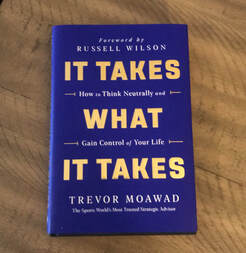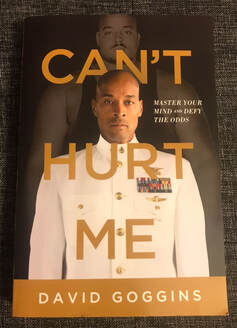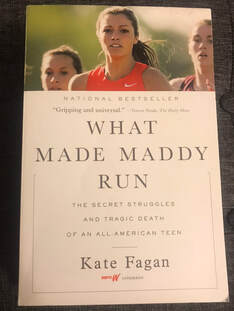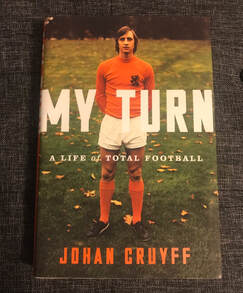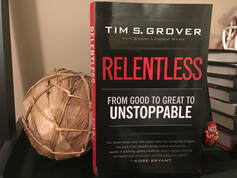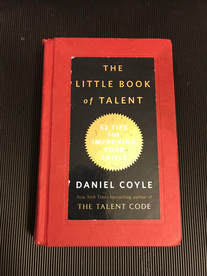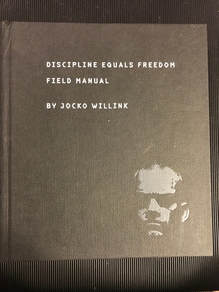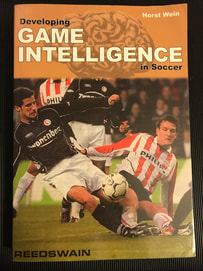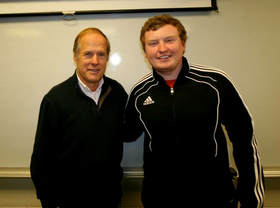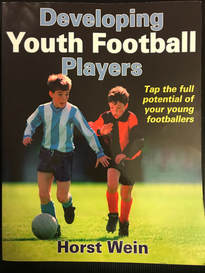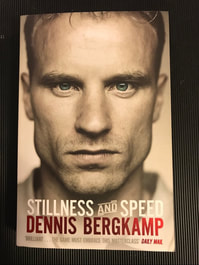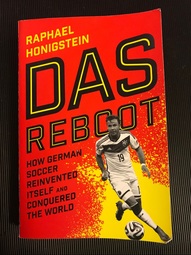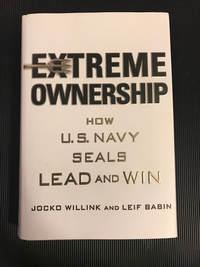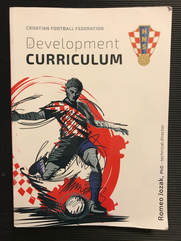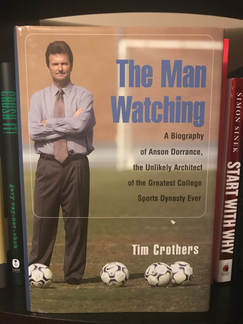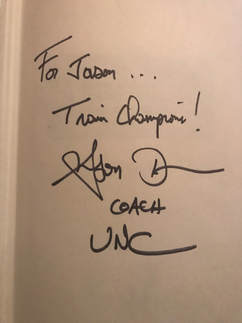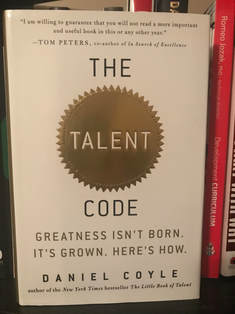Recommended Reading
Many of you know that I am an avid reader. Below are some books that have helped shape my philosophy when it comes to developing youth soccer players.
It takes what it takes | Trevor Moawad
The best book I've read in 2020! Trevor Moawad is known most for being Russell Wilsons mental coach, but he's also worked with USSoccer at the IMG Academy, several professional athletes as well with the Alabama, Georgia, and Florida States football programs.
Excerpts from It Takes What It Takes:
Excerpts from It Takes What It Takes:
- The most dangerous bias when discussing performance is our innate privileging of the past. We elevate the past. We give it too much importance. We serve the past when we should be giving it a wide birth.
- He knew there are three distinct states: what has happened, what is happening, and what will happen.
- As a starting quarterback, you've got to be able to go to the truth. Neutral thinking lets you go to the truth. And stay there. And live there.
- Don't worry about what you feel. Rely on what you know.
- Confidence is the belief that you can do what is demanded.
- We all want things, and there's value to that; want is a precursor to motivation. But want is an idea. Commitment is execution.
- My influence on you has one-tenth the power of your influence on yourself. You have ten times the influence I do when it comes to you.
- "Process of elimination is the first step" to any serious improvement. One less bad option opens the door for a new and better option to appear more clearly.
- Exposed is a neutral term... You can be exposed as a fraud. You can also be exposed as a winner. The highest achievers - in sports, in business, in the military - actually embrace the opportunity to be exposed. Why? Because they've prepared for the moment.
- The best day of your life is the one on which you decide your life is your own. No apologies or excuses. No one to lean on, rely on, or blame. The gift is yours- it is an amazing journey- and you alone are responsible for the quality of it.
Can't Hurt Me | David Goggins
This is by far the best book on mental toughness I've ever read.
Excerpts from Can't Hurt Me:
Excerpts from Can't Hurt Me:
- In the military we always say WE DON'T RISE TO THE LEVEL OF OUR EXPECTATIONS, WE FALL TO THE LEVEL OF OUR TRAINING, and as I hiked up the winding highway with my blister barking, I fell into the same rhythm I'd find on my long rucks in the desert around Niland.
- Its funny, humans tend to hatch our most challenging goals and dreams, the ones that demand our greatest effort yet promise absolutely nothing, when we are tucked into our comfort zones. I was at work when Kostman laid out his challenge for me. I'd just had a warm shower. I was fed and watered. I was comfortable. And looking back, every single time I've been inspired to do something difficult, I was in a soft environment, because it all sounds doable when you're chilling on your f***ing couch, with a glass of lemonade or a chocolate shake in your hand. When we're comfortable we can't answer those simple questions that are bound to arise in the heat of battle because we don't even realize they're coming.
- A true leader stays exhausted, abhors arrogance, and never looks down on the weakest link. He fights for his men and leads by example. That's what it meant to be uncommon among uncommon. It meant being one of the best and helping your men find their best too. It was a lesson I'd wish sunk in a lot deeper, because in just a few more weeks I'd be challenged in the leadership department and come up well short.
- A lot of us surround ourselves with people who speak to our desire for comfort. Who would rather treat the pain of our wounds and prevent further injury than help us callous over them and try again. We need to surround ourselves with people who will tell us what we need to hear, not what we want to hear, but at the same time not make us feel we're up against the impossible. My mother was my biggest fan. Whenever I failed in life she was always asking me when and where I would go after it again. She never said, Well, maybe it isn't meant to be.
What Made Maddy Run | Kate Fagan
From the back cover of What Made Maddy Run:
If you scrolled through the Instagram feed of nineteen year old Maddy Holleran, you would see a perfect life: a freshman at an Ivy League school, recruited for the track team, who was also beautiful, popular, and fiercely intelligent. Maddy was someone who succeeded at everything she tried. But when she began her long awaited college career, her parents noticed that something was different. Previously indefatigable, Maddy became withdrawn, and her thoughts centered on how she could change her life. In spite of thousands of hours of practice and studying, she contemplated transferring from the school that had been her dream. When Maddy's dad, Jim, dropped her off for the first day of spring semester, she held him a second longer than usual. That would be the last time Jim would see his daughter.
This is the story of Maddy Holleran's life and her struggle with depression, which also reveals the mounting pressures young people - and college athletes in particular - face to be perfect in an age of relentless connectivity and social-media saturation.
Excerpts from What Made Maddy Run:
Last Read: 5/3/2019
If you scrolled through the Instagram feed of nineteen year old Maddy Holleran, you would see a perfect life: a freshman at an Ivy League school, recruited for the track team, who was also beautiful, popular, and fiercely intelligent. Maddy was someone who succeeded at everything she tried. But when she began her long awaited college career, her parents noticed that something was different. Previously indefatigable, Maddy became withdrawn, and her thoughts centered on how she could change her life. In spite of thousands of hours of practice and studying, she contemplated transferring from the school that had been her dream. When Maddy's dad, Jim, dropped her off for the first day of spring semester, she held him a second longer than usual. That would be the last time Jim would see his daughter.
This is the story of Maddy Holleran's life and her struggle with depression, which also reveals the mounting pressures young people - and college athletes in particular - face to be perfect in an age of relentless connectivity and social-media saturation.
Excerpts from What Made Maddy Run:
- Exactly when do our young people have time to develop their own sense of self? When are they able to be alone, to understand how they think, what they really want - without the pretense of how it might look on a college application?
- Kids used to grow up in the neighborhood, on the block or in the parks, playing games with other kids. These games had rules, but the kids themselves determined them, flexing their imaginations... Scientists have also noted a correlation between the decreasing amount of childhood free play - any play not directed by adults - and the increasing rates of anxiety and depression among kids. As free play decreases, anxiety increases.
- Sometimes as early as elementary school - at which parents define children as athletes makes it more difficult to cultivate other parts of their identity. Very little else in our society is rewarded as athletics are. And when you're young, the distinction between an activity that truly satisfies your should and one that merely brings accolades is difficult to parse. For many, those two things aren't mutually exclusive. For others, sports are actually not their passion, a realization that doesn't come until they're put into the fire of college sports.
Last Read: 5/3/2019
My Turn | Johan Cruyff
Excerpts from My Turn:
- Team training sessions are all well and good, but players also need to understand how their individual skills can be improved for the benefit of the team. As a manager, do you give your players homework to do? Or after a session do you take a couple of them aside and explain the difference between a pass through the air and one along the ground.
- Playing games always alternated with maintaining and developing these five basic fundamentals of football: shooting, heading, dribbling, passing and controlling the ball. So we were always really busy with the ball. This way of training has always remained the standard for me. It's led me to realize that the easiest way is often the hardest. So I see touching the ball once as the highest form of technique. But to be able to touch the ball perfectly once, you need to have touched it a hundred thousand times in training, and that's what we spent our time doing.
- What are trophies and medals other than mementoes of the past? At home I have nothing on my walls about football. When I was awarded an honor, the medal I was given disappeared into my grandchildren's toy box. Football is a game of mistakes. What I loved was the mathematics of the game, the analysis, how to improve.
- I'm mostly trying to explain how important it is that new talent should work on the ground rules from a young age. The sooner they master those, the more they learn later on, and to be honest, there isn't much point moving on if you haven't sorted out the foundations. Only then can you start talking about putting the ideal team together, formed with players who aren't just unusually talented, but who have all mastered the basics of football.
- Learning to pass the ball correctly is simply a matter of repeating it over and over. This might be boring, but you are honing the most essential aspect of the game. The same goes for receiving the ball - it is tedious to do, but you make quick progress. Then you have to combine these basic techniques with positional play.
Relentless | Tim S. Grover
Excerpts from Relentless:
- I don't care how good you think you are, or how great others think you are - you can improve, and you will. Being relentless means demanding more of yourself than anyone else could ever demand of you, knowing that every time you stop, you can still do more. You must do more.
- Do. The. Work. Every day, you have to do something you don't want to do. Every day. Challenge yourself to be uncomfortable, push past the apathy and laziness and fear. Otherwise, the next day you're going to have two things you don't want to do, than three and four and five, and pretty soon, you can't even get back to the first thing. And then all you can do is beat yourself up for the mess you've created, and now you've got a mental barrier to go along with the physical barriers.
- With Michael (Jordan), everything became automatic; he repeated those same movements over and over until he didn't have to think about anything, he only had to let those instincts take over... real learning doesn't mean clinging to the lessons. It means absorbing everything you can and then trusting yourself to use what you know instantaneously, without thinking. Instinctive, not impulsive... quick, not hurried. Knowing without a doubt that all the hours of work have created an unstoppable internal resource you can draw on in any situation.
THE LITTLE BOOK OF TALENT | Daniel Coyle
EXCERPTS FROM THE LITTLE BOOK OF TALENT:
- If I had to sum up the difference between people in the talent hotbeds and people everywhere else in one sentence it would be this: "People in hotbeds have a different relationship with practicing."
- Prioritize the hard skills because in the long run they're more important to your talent. At Spartak, the Moscow tennis club, there is a rule that young players must wait years before entering competitive tournaments. "Technique is everything," said coach, Larisa Preobrazhenskaya. "If you begin playing without technique it is big mistake."
- One of the most unfortunate things I see when identifying youth players is the girl who is told over the years how great she is. By the time she's a high school freshman, she starts to believe it. By her senior year, she's fizzled out. Then there's her counterpart: a girl waiting in the wings, who quietly and with determination decides she's going to make something of herself. Invariably, this humble, hardworking girl is the one who becomes the real player."
DISCIPLINE EQUALS FREEDOM FIELD MANUAL | Jocko Willink
EXCERPTS FROM DISCIPLINE EQUALS FREEDOM
- Don't worry about motivation. Motivation is fickle. It comes and goes. It is unreliable and when you are counting on motivation to get your goals accomplished - you will likely fall short. So. Don't expect to be motivated every day to get out there and make things happen. You won't be. Don't count on motivation. Count on Discipline.
- Everyone wants some magic pill - some life hack - that eliminates the need to do the work. But that does not exist. No. You have to do the work. You've got to hold the line. You've got to make it happen.
BOOKS BY HORST WEIN
Back in my club coaching days, a former mentor of mine paid to have Horst Wein come to Michigan and host a three day coaching course for the staff of the club as well as nearby clubs. Above all of the formal coaching courses I've taken, that three day course was the most beneficial and has shaped my coaching philosophy more than the others.
Horst Wein was perhaps the world's foremost mentor of soccer coaches and trainers. He has taught the coaches of institutions in 53 countries covering four continents and has written 31 sport-related textbooks, including four in soccer.
Wein, an Olympic silver medal winner as a coach, was the first coach from the Western world to be invited to train top athletes in the former Soviet Union in the late 1970's. He also has served as a consultant for two Olympic Games, the Asian Games, and one of the most important soccer clubs in the world, Internazionale Milan.
Shortly before his death, Horst Wein worked cooperatively with the Center for Research and Studies of the Royal Spanish Football Federation. He also traveled extensively helping others adapt the game of soccer to better suit their young players. The United Nations asked him for help in designing their project of Football Schools in Central and South America, and Nike United Kingdom appointed him as head coach for their famous Premier Football Training program.
Wein, an Olympic silver medal winner as a coach, was the first coach from the Western world to be invited to train top athletes in the former Soviet Union in the late 1970's. He also has served as a consultant for two Olympic Games, the Asian Games, and one of the most important soccer clubs in the world, Internazionale Milan.
Shortly before his death, Horst Wein worked cooperatively with the Center for Research and Studies of the Royal Spanish Football Federation. He also traveled extensively helping others adapt the game of soccer to better suit their young players. The United Nations asked him for help in designing their project of Football Schools in Central and South America, and Nike United Kingdom appointed him as head coach for their famous Premier Football Training program.
STILLNESS AND SPEED | Dennis Bergkamp
EXCERPTS FROM STILLNESS AND SPEED:
- "But I was inventive in scoring goals, like lobbing the goalkeeper. I always liked that. Always with a thought, not just hit it but thinking: 'What can I do?'"
- "So that's one of the things we try to do with the training now in the Youth - give players the chance to develop themselves into creative, special, unique individuals. We can't copy what we did in the past. Somehow we have to find a different way, so the players who come into the first team are creative again can think for themselves, can make a difference, basically. Be special. Be unique. Thats what we want. You can't be unique if you do the same thing as the ten other players. You have to find that uniqueness in yourself."
- "Dennis sees everything. He maintains connections and drives people. You called him a Jack of all trades, but I prefer to call him the PLAYMAKER within the technical heart."
DAS REBOOT | Raphael honigstein
EXCERPTS FROM DAS REBOOT:
- "Football, he believes, remains a 'player-driven game.' Americans sometimes find that hard to understand, Klinsmann says, because most team sports are considered coaching-driven there. 'You'll often see players look to the coach for direction. But football doesn't work like that, because its too fluid. You need players to take charge."
- "The football that is being played today has nothing to do with different training plans for a "more modern football" School reiterates. 'It's simply due to talented players at eighteen, nineteen or twenty having enjoyed between 50 and 100 percent more training sessions in their lives than those who came into the league at the same age fifteen years ago. Elite youngsters trained there, at most four times a week. Now it's six to nine times a week, with full-time professionals who don't just happen to know football but can also teach it."
- "The biggest, most eye-catching day-to-day change on practice pitches Kersting can attest to is the prevalence of individualized drills: 'Footballers spend nearly as much time on the ball by themselves now as playing with the team.'"
EXTREME OWNERSHIP | Leif Babin and Jocko Willink
EXCERPTS FROM EXTREME OWNERSHIP
- When it comes to performance standards, "It's not what you preach, it's what you tolerate."
- "The best leaders are not driven by ego or personal agenda. They are simply focused on the mission and how best to accomplish it."
- "Many of the disruptive issues that arise within any team can be attributed directly to a problem with ego."
- "In the SEAL Teams, we strive to be confident, but not cocky. We take tremendous pride in the history and legacy of our organization. We are confident in our skills and are eager to take on challenging missions that others cannot or aren't willing to execute.
- "There are no bad teams, only bad leaders. How is it possible that switching a single individual - only the leader - had completely turned around the performance of an entire group? The answer: leadership is the single greatest factor in any team's performance. Whether a team succeeds or fails is all up to the leader. The leader's attitude sets the tone for the entire team. The leader drives performance - or doesn't. And this applies not just to the most senior leader of an overall team, but to the junior leaders of teams within the team.
CROATIAN FOOTBALL FEDERATION: DEVELOPMENT CURRICULUM
EXCERPTS FROM CFF DEVELOPMENT CURRICULUM
- It takes thousands of precise and rapid repetitions to start the formation of an engram, and hundreds of thousands and millions of repetitions at the edge of ability for a skill to be perfected. "Repetitio est mater studiorum" or Repetition is the mother of learning.
- Automatism or knowledge which is stored in the subconscious mind does not limit creativity. On the contrary, automatism is what enables and enhances a greater expression of creativity and a faster and better decision-making process.
- Premature specialization leads to expert performance at an early age and often afterwards, due to stagnation, athletes give up the sport in or before the senior stage.
- Legendary Liverpool striker, Michael Owen, described this danger of being the best in your group for too long. "You always have to be surrounded by excellent players. When you reach a certain level, you have to go to the next one, otherwise you become lazy and that is the biggest danger to your career."
The Man Watching | Tim Crothers
Since I began coaching, I have followed Anson Dorrance more than any other soccer coach. He has transcended soccer in the United States and really shows that Americans can also be great coaches. I have been lucky enough to meet him, hear him speak, and have developed players that went on to play for him at the University of North Carolina. Currently chasing his 24th NCAA Championship.
EXCERPTS FROM THE MAN WATCHING
- "He told me that if the job was just about winning and losing then it's not particularly interesting, but that you get to have an impact on people's lives."
- "Coming to UNC, I would have never have expected so much support. He gets into your head, and if you allow him to he can make a total positive impact on your life. He motivated me to work harder in school, to stop eating huge meals at four in the morning, to drink less beer, to change my lifestyle. He motivated me to motivate myself. No other coach ever knew how to talk to me without preaching to me."
- He is one of the few coaches who gives his team Saturdays off between games on Friday and Sunday. He usually plays golf on those Saturdays and doesn't see his players at all, believing both sides can use the break. "In a weird way, it's part of the Carolina tradition that the girls are left on their own," Pete says. "They're not as nurtured as they be in another program. They're treated as adults."
- "In a good coach/player relationship there should be a tension, it's my Jove to bring them to their potential, and that's never entirely comfortable for them. Maybe of them don't like the way I push them. Bummer. There may be times when I'm driving a player when all she's hearing is ' I don't like you' or 'I don't respect you,' but I obviously respected her game enough to pick her to play for me. My players don't have to like me for me to like them. You have to coach through your own personality, so I'm never going to be their fairy godmother. I'm going to get after them, because thats who I am and who I've always been."
LAST READ: January 18th, 2007
THE TALENT CODE | Daniel Coyle
EXCERPTS FROM THE TALENT CODE
- They are purposely operating at the edges of their ability, so they will screw up. And somehow screwing up is making them better.
- No time plus no space equals better skills. Futsal is our national laboratory of improvisation." - Dr. Emilio Miranda
- Exeter University estimates that Mozart, by his sixth birthday, had studied 3,500 hours of music with his instructor-father, a fact that places his musical memory in the realm of impressive but obtainable skill.
- There's no special treatment for anybody. At my old school they let me slide. I could do five out of ten things and nobody cared. Here I do ten out of ten.
- John Wooden didn't give speeches. He didn't do chalk talks. He didn't dole out punishment laps or praise. In all, he didn't sound or act like any coach they'd ever encountered.
- Repetition is the key to learning.
LAST READ: January 25th, 2013
